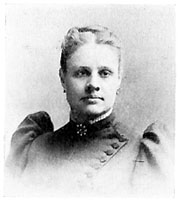Hon. Henry L. Dawes.
while her horse's hoofs rang loud and clear as she rode off to hillside or cliff, to lakeside or glen, ten, twelve, yes, sometimes five-and-twenty miles a-gallop before breakfast. Who would not guess she was English? They tell of her meeting with Bret Harte; of her dance with the gay Louis Kossuth in the parlors of the Curtis House; of the little volume of poems sold to purchase a new saddle-horse; of the clock in the Congregational Church up on the hill, —her gift from the proceeds of a single night's reading of Shakespeare. Lenox is full of dramatic incidents relating to this dramatic character. She was fond of fishing in the lake which Hawthorne loved so well. In earlier years, discarding her usual finery and clad in straw hat, blouse, and bloomers, she would be on the lake hours together in a little boat not overclean and somewhat leaky. Once some one chided her for her carelessness in dress. Turning sharply and drawing herself up to her full height, she replied,
"I tell you, once for all, I dress for the occasion; whether for the stage, for my readings, or for the drawing-room, I have for each a fitting costume. And when I go a-fishing I, too, dress for the occasion!" The dramatic emphasis upon these last two words revealed two things, —first that her costume was to continue unchanged; and second; that she considered "going a-fishing" fully as much an occasion of her life as the impersonation of Juliet or Lady Macbeth.
Before we turn quite away from Lenox, toward Pittsfield, two other interesting characters suggest themselves, —Dr. William Ellery Channing and Henry Ward Beecher. Dr. Channing came to Lenox in delicate health for several summers during the later years of his life. Here he found a goodly circle of cultivated and congenial friends, not least among whom were Catherine Sedgwick and Mrs. Kemble. He frequently preached in the Lenox Congregational Church. Here, as elsewhere, his serenity, his candor, his straightforward yet scholarly eloquence, inspired by high conceptions of life, won him a host of admirers. He delivered the last public address of his life at the Lenox church in August of 1842. In it he says, "I cannot soon forget the beautiful nature and the generous spirits with which I have been privileged to commune in the valley of the Housatonic." This address was on the "Freedom of the Slave," it being the one hundredth anniversary of emancipation in the West Indies. His own nature, always fervid in the cause of reform, found additional inspiration in his surroundings. "Amidst these vast works

Anna L. Dawes.
-- page 10 --
|